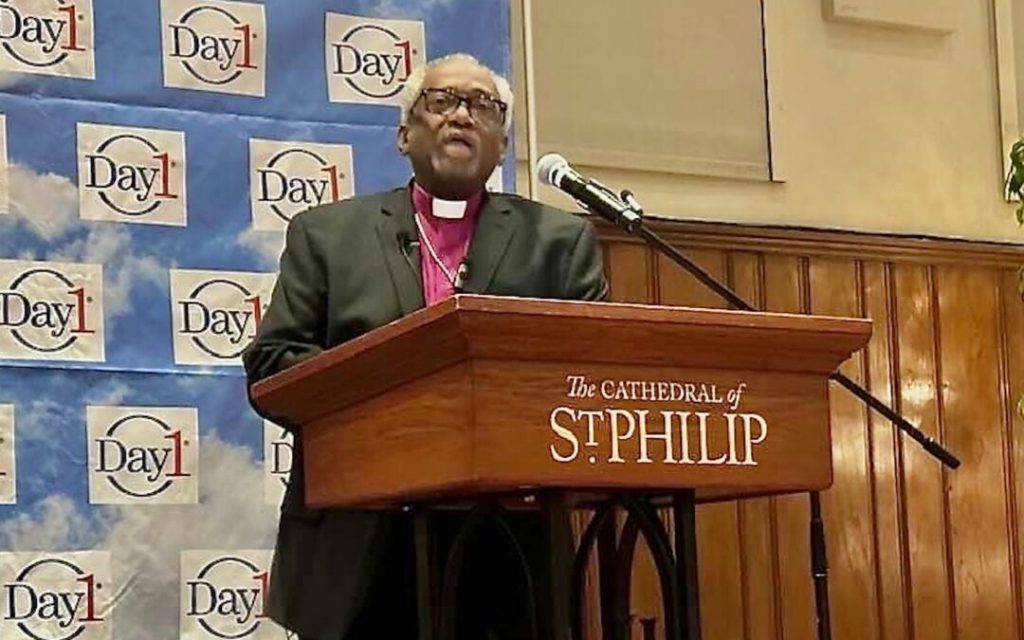
However, the bishop said a stoic security person suddenly looked alarmed, apparently thinking he’d heard “There’s a bomb in Gilead” coming from the preacher’s mouth.
“I’m here to suggest that Christianity goes astray when it does not look and talk like Jesus of Nazareth.”
So said the Presiding Bishop of the Episcopal Church Michael B. Curry to an ecumenical gathering of supporters of Day1, a Protestant radio preaching ministry dating back to 1945.
“Look at the history of Christianity,” said Curry. “We stray when Jesus — his teachings and his spirit — is not our way. Then we lose our way.”
Whenever the church makes “the mistake of playing the grand inquisitor” and does “evangelism by persecution” it goes off track, Curry told the March 21 gathering at the Cathedral of St. Philip in Atlanta.
The first African American Presiding Bishop of the American Episcopal Church is well known for delivering the stirring sermon at the 2018 royal wedding of Britain’s Prince Harry to American actress Meghan Markle in St. George’s Chapel at Windsor Castle.
Curry told the Atlanta gathering that the Archbishop of Canterbury negotiated for more time than the three minutes first allotted for the wedding sermon, adding: “Three minutes isn’t enough time to wipe the sweat from your brow.”
The sermon received widespread praise for its bold and impassioned call for justice, “the redemptive power of love” and a Christian faith that is focused on following Jesus as revealed by his life and teachings.
Curry said he chose to reference the traditional spiritual “There is a balm in Gilead,” but first confirmed it would be familiar to many of his listeners across the pond.
Curry said he quickly added: “It’s a healing balm.”
Curry told his Atlanta listeners that getting out a Jesus-centered message through broadcasted sermons and other means is very important at a time when the faith is often misconstrued, and lives seem expendable.
He noted the destructive forces that result in war, insurrection and other forms of violence. “I’m running out of dioceses in the United States where there hasn’t been a mass shooting.”
“Day1 matters because we need to get the message of Jesus of Nazareth out in this world,” he said. “I mean the message of the Sermon on the Mount — that Jesus.”
Advancing the kind of love that heals brokenness, said Curry, is “the work of God in our time, and that love is the heart of Christianity.”
“When that message is lost, so are we,” he added. “And when it’s found, it sets us free.”
Curry said he was raised in a broader family with Episcopal, Baptist and Pentecostal roots. Attending family funerals took on different forms depending on the faith tradition.
He joked that the post-funeral meal from an Episcopal service was at 11 a.m. and at around 1 p.m. following a Baptist service. If a Pentecostal funeral, he learned to expect lunch at supper time.
More Baptists were in his family, and he recalled the Baptist pastor who often spoke about the “dash” that separates the dates of one’s birth and death. The eulogist would ask the gathered living: “What are you going to do with the dash?”
Curry called for avoiding the “illusions of power” and focusing on matters of significance to faithful living. Jesus, he said, “has something to commend to this generation.”
Recalling the Luke 10 account of Jesus being asked by a lawyer about what is required to inherit eternal life, Curry said the question was a search for the kind of life that makes a difference.
Jesus’ life and teachings lead us to that kind of use of the “dash” over which we have control, unlike the dates of our beginnings and ends, he said.
Jesus’ two-fold command to love God with all one’s being and others as oneself not only answered the proposed question for this one person, he noted, but for all.
“What Jesus was getting at is that this is the key to life that not even death can take away.”
In a time when so many voices are redefining Christianity in exclusive and unloving ways, it is heartening to hear this impassioned and influential church leader calling for a faith that is rooted in Jesus’ clear call to “follow me.”
In a series of opening questions, Bishop Curry asked: “Is a little bit of the kingdom of heaven possible on this earth?”
He tipped his hand by adding, “I wouldn’t be standing up here if I didn’t believe it was.”
Curry affirmed Jesus as “an equal opportunity lover” whose “way of love is the way of life.”
It was refreshing and hopeful to hear the echoes of a Jesus worldview that resists the onslaught of fearful, exclusive and power-seeking misrepresentations of Christianity that often downplay what Jesus has always called his followers to be and to do.
